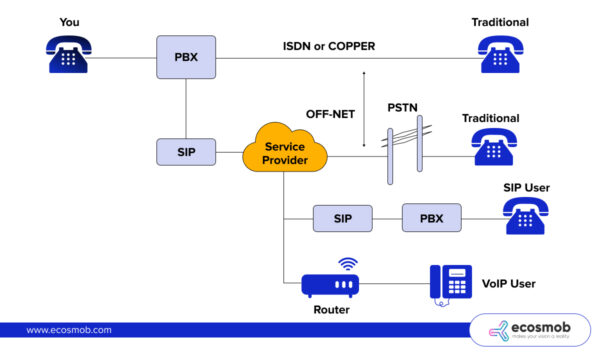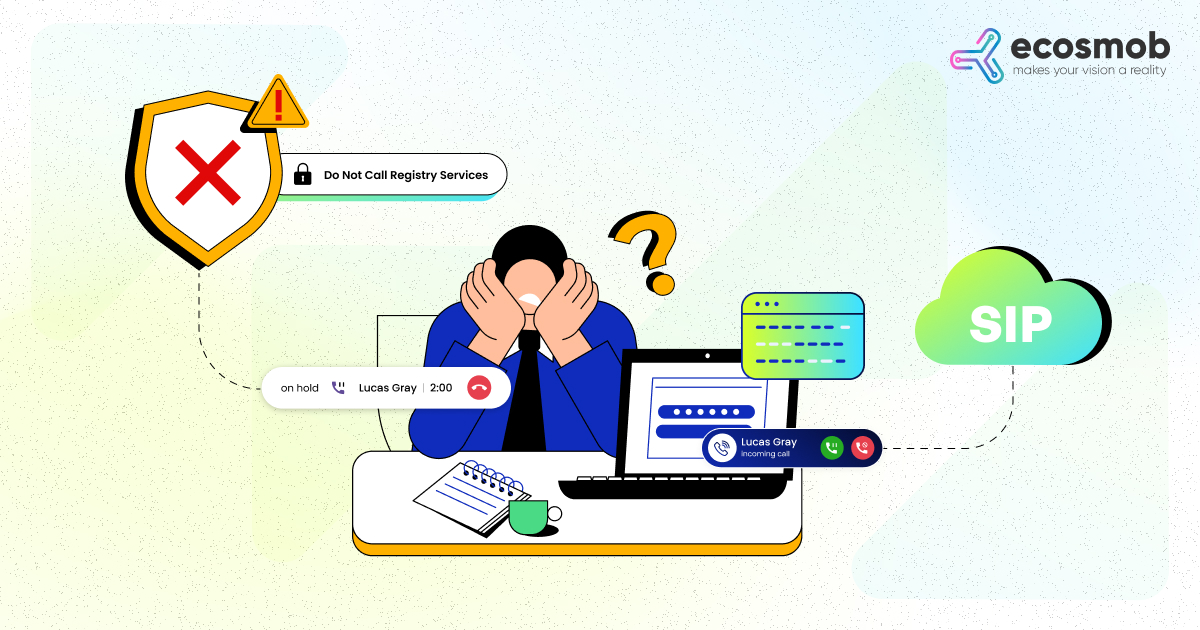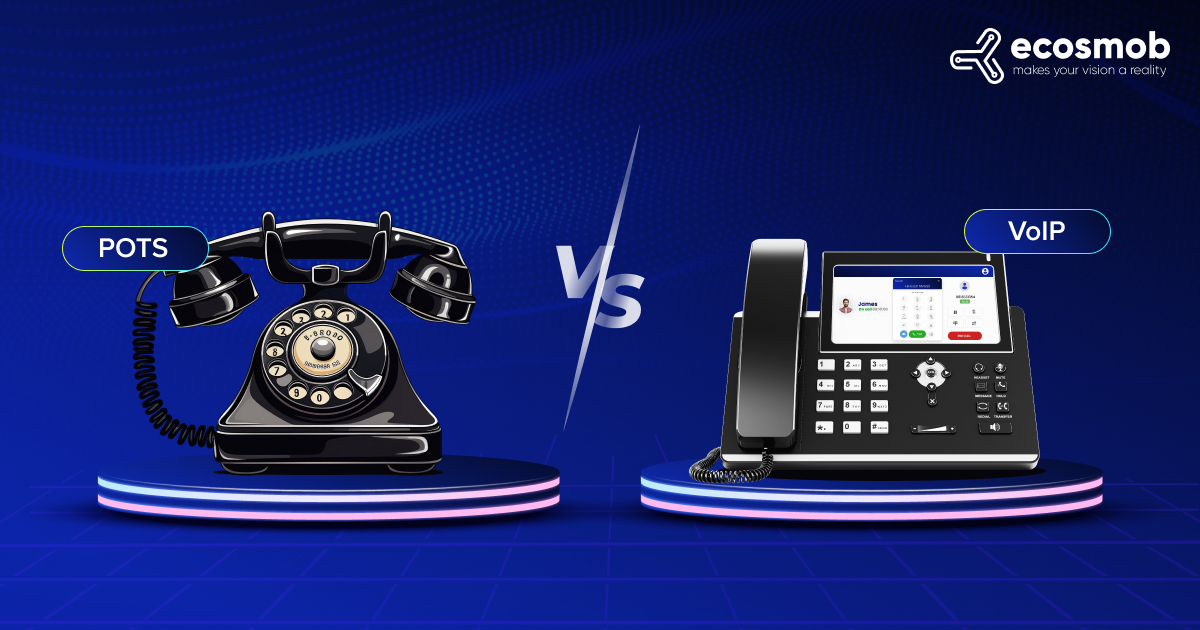QUICK SUMMARY
A SIP proxy server manages SIP signaling for VoIP systems, enabling efficient call routing, secure communications, and scalability. It plays an important role in enhancing reliability and performance in modern telecommunications.
When talking about modern communications, especially VoIP (Voice over Internet Protocol), one term you’ll come across often is “SIP.” The Session Initiation Protocol, or SIP, has quietly but profoundly changed how we communicate by enabling rich media interactions over the Internet. A critical part of this technology is the SIP server, called the SIP proxy. But what exactly is a SIP server? How does it function? And why does it play such a crucial role in telecommunications?
If you’re wondering about these things, you’re in the proper place. This blog will cover all you need to know about SIP servers and proxies, including their definitions, methods of operation, and significance for contemporary communication.
What Is a SIP Server?
A SIP server is a critical component in Voice over IP (VoIP) networks, operating within the SIP (Session Initiation Protocol) ecosystem. Its primary function is facilitating the setup, management, and termination of voice calls over IP networks. The SIP server essentially acts as a “middleman,” managing all aspects of real-time communication sessions, including voice, video, and messaging.
According to UC today, the market for cloud telephony services is expected to reach a value of approximately $51.5 billion by 2032. Transitioning into the cloud gives companies more freedom to empower their employees wherever they are, innovate quickly, and reduce inefficiencies.
Boost Your Network Performance – Dive into Our Complete SIP Proxy Guide & Outpace the Competition!
There are two main types of SIP servers:
- SIP Proxy Server: This server routes SIP messages between clients (often referred to as user agents) and handles address resolution and authentication.
- SIP Registrar Server: Manages SIP clients’ registrations and location services, ensuring calls reach the right endpoint.
Key Functions of a SIP Server
Here are some of the critical functions of a SIP Server:
1. Call Routing and Session Management
The most prominent function of a SIP server is to manage sessions and route calls efficiently. When a call is initiated, the server locates the correct destination and sets up the path for communication. As a SIP proxy server, it determines the best route for the SIP messages, ensuring they reach the right users while maintaining optimal network performance.
2. User Authentication and Registration
A SIP server registers users as they connect to the network. This registration process involves storing the IP address, device information, and availability status, allowing seamless communication. The server authenticates users through credentials like usernames and passwords, offering secure access to the network while preventing unauthorized usage.
3. Address Resolution
When a call is made, the SIP server translates the user’s public address into a network-specific address, a process known as address resolution. It works as a translator, ensuring the call reaches the correct recipient, regardless of the network they are connected to. This function is handy when users are on different networks or have changed locations.
4. SIP Signaling Protocol Control
The SIP signaling protocol controls communication session setup, modification, and termination. The SIP server manages the signaling process, establishing the rules for how SIP messages are exchanged and interpreted. This protocol governs how sessions are initiated, who can join, and what parameters (such as codec type or media) will be used during the session.
5. Session Termination and Transfer
When a call or session ends, the SIP server terminates the communication session cleanly, releasing all associated resources. Additionally, it enables functions like call transfers, call forwarding, and even call redirection to other users or devices, enhancing communication flexibility within the network.
As the demand for seamless, real-time communication grows, SIP servers and proxies will remain indispensable for reliable and secure communications over IP networks.
How Does a SIP Server Work?
To understand how a SIP server works, it’s essential to understand the flow of SIP signaling. Here’s a step-by-step breakdown of a typical SIP session:
- Registration: When a user logs in to their SIP device (e.g., a softphone app), an SIP REGISTER message is sent to the SIP server to let the server know the user is online and ready to communicate.
- Session Initiation: When a call is made, an INVITE message is sent from the caller’s SIP client to the SIP proxy server. This message contains details such as the caller’s media capabilities.
- Routing: The SIP server then routes this INVITE to the destination SIP client.
- Call Setup: The recipient acknowledges the call with a 200 OK message. The caller then confirms receipt with an ACK message, and the media session (voice or video) is established directly between the endpoints.
- Call Maintenance: During the call, other SIP messages are exchanged to handle features like hold, transfer, or conference calling.
- Session Termination: When either party hangs up, a BYE message is sent, and the server closes the session.

A SIP server facilitates communication sessions by managing signaling between endpoints. By efficiently managing these processes, a SIP server ensures smooth and direct communication between users.
SIP Proxy vs. SIP Server: What’s the Difference?
Two terms often come up within this framework: SIP Server and SIP Proxy. Though they might sound similar, they serve distinct purposes in SIP telecommunications and VoIP systems. Knowing the distinctions will enable you to choose the best strategy for your company’s requirements.
What Is a SIP Server?
A SIP Server is a general term for a server responsible for managing SIP communications. It’s like a central hub that manages SIP signaling, controls call setup and teardown and handles registrations, authentications, and routing features. In essence, a SIP server is the “brain” of SIP telecommunications.
A SIP server could fulfill multiple roles within the SIP architecture:
- Registrar Server: It handles the registration process, mapping users’ addresses (SIP URI) to their respective IP addresses.
- Proxy Server: As an intermediary, it routes SIP requests from one endpoint to another.
- Redirect Server: It guides SIP requests to the user’s current location but doesn’t pass the request itself.
The term “SIP server” can be seen as an umbrella encompassing all SIP server types—making it a bit broad. Let’s focus on one of its most vital components: the SIP Proxy Server.
What Is a SIP Proxy Server?
A SIP Proxy Server is a server that acts as an intermediary between endpoints (e.g., VoIP phones, softphones, etc.) in a SIP network. Its primary function is to forward or “proxy” SIP requests and responses, handling the signaling in setting up and managing calls.
The SIP Proxy Server does not handle media traffic (RTP streams); its sole responsibility is SIP signaling, managing how SIP packets are routed through the network. It is a crucial distinction between a SIP proxy and other SIP servers.
In practice, a SIP proxy can:
- Forward SIP Requests and Responses: It routes INVITE messages (to initiate calls), BYE messages (to terminate calls), and other SIP messages to the correct destination.
- Policy Implementation: It can enforce policies like call authorization, number translation, and security features, including blocking untrusted IP addresses.
- Load Balancing: By distributing traffic across multiple SIP servers, the SIP proxy helps to manage network load and improve performance.
Think of a SIP proxy as the “air traffic controller” of the SIP world, managing the flow of signaling messages between endpoints.
SIP Proxy vs. SIP Server: Core Differences
Although all SIP proxy servers are essentially SIP servers, not all SIP servers are SIP proxies. Let’s break down the differences in more detail:
1. Functionality and Role
- SIP Server: It is a broad term covering multiple roles, such as registration, redirection, and proxying. A SIP server is often the overarching component that manages user registration, authentication, call routing, and more.
- SIP Proxy Server: A SIP proxy’s primary role is to forward SIP messages between endpoints. It does not store the actual session data or participate in the media transfer. Its focus is exclusively on SIP signaling protocol.
2. Media Handling
- SIP Server: Depending on its configuration, a SIP server can handle signaling and media. For example, a SIP Back-to-Back User Agent (B2BUA) is a server that maintains a call state and can modify SIP messages and media streams.
- SIP Proxy Server: An SIP proxy deals only with SIP signaling and never handles media traffic directly. Media is typically relayed between endpoints using other servers, such as session border controllers (SBCs).
3. State Management
- SIP Server: Depending on its type, a SIP server may or may not be stateful. A stateful server keeps track of call session information and may store session state throughout a call.
- SIP Proxy Server: It can be either stateful or stateless. A stateful SIP proxy remembers the call state and keeps session details during the transaction, which can aid in handling complex routing and security policies. A stateless proxy forwards SIP messages without storing any session data.
While all SIP proxy servers fall under the broader category of SIP servers, their roles and functionalities differ significantly. A SIP server encompasses a range of roles, from registration to call management, and handles signaling and media, depending on its configuration. On the other hand, a SIP proxy server is specialized, focusing solely on SIP signaling and message forwarding without handling media traffic directly. Additionally, SIP servers may vary in state management, whereas SIP proxies can be stateful or stateless, impacting their call-handling capabilities. Understanding these differences is essential when selecting the exemplary architecture for your communication needs.
| Aspect | SIP Server | SIP Proxy Server |
| Functionality and Role | Broad term covering roles such as registration, redirection, and proxying. Manages user registration, authentication, and call routing. | Primarily forwards SIP messages between endpoints without storing session data or participating in media transfer. Focused on SIP signaling protocol. |
| Media Handling | Can handle both signaling and media. A SIP Back-to-Back User Agent (B2BUA) can maintain call state and modify SIP messages and media streams. | Deals only with SIP signaling and does not handle media traffic directly. Media is typically relayed through other servers. |
| State Management | May be stateful or stateless. A stateful server stores session state throughout a call. | Can be stateful or stateless. A stateful proxy maintains session details during the transaction, while a stateless proxy only forwards messages. |
SIP Server vs. SIP Proxy Server— Which One Is Best?
The choice between a SIP Server and a Proxy Server largely depends on your communication needs and VoIP architecture. If you aim to route SIP signaling and control how call requests are handled, an SIP Proxy Server is the ideal solution. However, a more comprehensive SIP Server setup might be necessary if you need an all-in-one solution that handles registration, signaling, and potentially even media.
In addition, most modern SIP-based VoIP systems use a combination of both SIP servers and SIP proxy servers to achieve a robust and efficient communication setup.
Understanding the distinctions between SIP Server and SIP Proxy Server can significantly improve the functionality and architecture of your telecom network, resulting in increased call quality, security, and dependability.
Benefits of Using a SIP Proxy in Telecommunications
SIP proxies are a critical part of VoIP and broader telecommunications systems. Here are some advantages they bring to the table:
1. Enhanced Security
As a gatekeeper, a SIP proxy can ensure that only individuals with permission can access the system. It can also implement encryption and other security protocols to protect communication from eavesdropping or fraud.
2. Scalability and Load Balancing
By distributing call traffic across multiple servers, a SIP proxy helps manage system load and ensures seamless communication even during high-traffic periods.
3. Efficient Call Routing
A SIP proxy server can dynamically route calls based on location, time, or specific rules, improving call quality and efficiency.
4. Seamless Integration and Interoperability
SIP proxies enable the integration of various communication channels (voice, video, messaging) and devices, providing a seamless user experience across different platforms.
The Future of SIP Proxies in Telecommunications
SIP proxies offer numerous benefits in telecommunications, from bolstering system security to enabling smooth scaling and efficient call management. By optimizing call routing and ensuring seamless integration across communication channels, SIP proxies play a pivotal role in enhancing the performance and reliability of VoIP and broader telecom systems. It makes them an indispensable component for businesses aiming for secure, efficient, and scalable communications.
Don’t Miss Out on SIP Efficiency - Read Now & Cut Your Costs by Up to 30%!
Ecosmob Technologies provides custom VoIP and unified communications solutions, leveraging SIP proxy servers to ensure robust, secure, and seamless business communication. With expertise in building scalable telecom solutions tailored to unique needs, Ecosmob empowers businesses to optimize their communications infrastructure.
FAQs
What is a SIP Proxy, and how does it differ from a SIP server?
A SIP proxy is a server that acts as an intermediary, routing SIP messages between clients to facilitate communication sessions like VoIP calls. While "SIP server" is a general term for any server handling SIP signaling (including proxies, registrars, and redirect servers), an SIP proxy focuses explicitly on the forwarding and routing of SIP requests without handling the actual media data.
What are the critical functions of a SIP server in telecommunications?
A SIP server handles user registration, session initiation, management, and termination and routes calls efficiently. It is also responsible for maintaining user locations, authenticating requests, and providing additional services like call forwarding, transfers, and conference calling while ensuring secure and reliable communication over IP networks.
Why are SIP proxies essential for VoIP systems?
SIP proxies are crucial for VoIP systems because they manage SIP signaling, allowing users to properly route voice, video, and messaging. They ensure secure, efficient communication, enable scalability by balancing traffic across servers, and provide call management features like session initiation, transfers, and terminations—all contributing to a smooth VoIP experience.
What are the benefits of using a SIP proxy for a business's communication system?
Using a SIP proxy offers multiple benefits: enhanced security through user authentication and encrypted signaling, better call routing for improved efficiency, load balancing to handle large traffic volumes, and seamless integration of multiple communication channels like voice, video, and messaging. It improves overall call quality, system reliability, and communication scalability.
How can SIP proxies improve the security of a VoIP system?
SIP proxies enhance security by controlling access to the communication system, authenticating users, and managing signaling encryption. They act as gatekeepers to protect against unauthorized access and help prevent common VoIP threats like call fraud, data interception, and denial-of-service (DoS) attacks, ensuring secure and trusted communication.

















